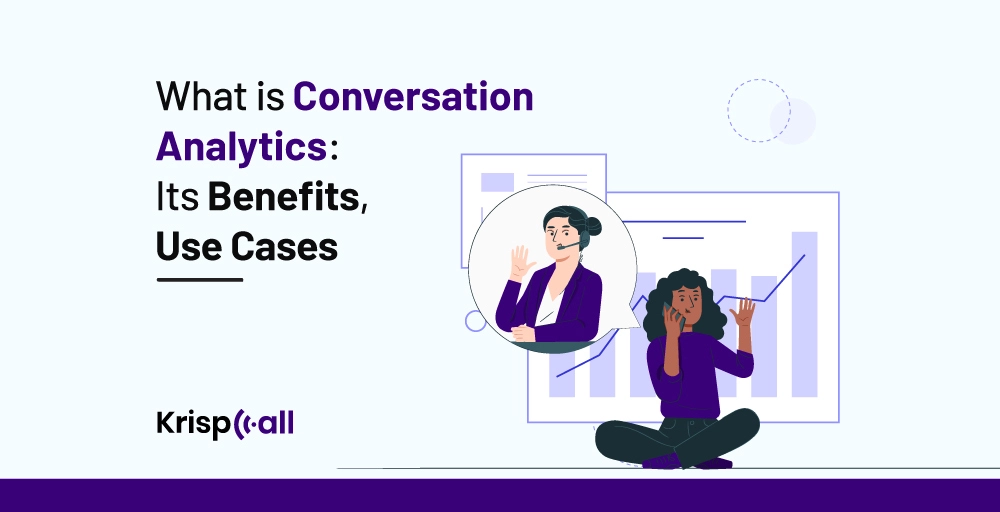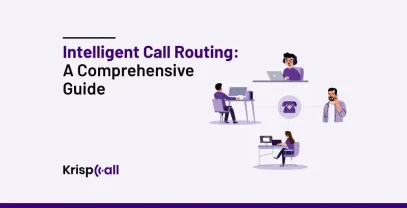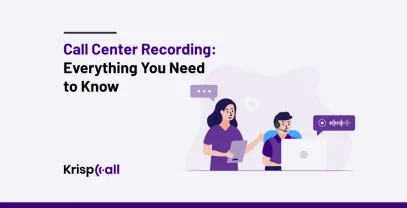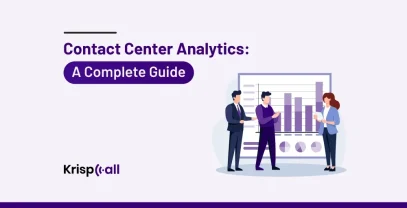There’s no doubt that, when it comes to customer data, nothing generates more – or more valuable – information than understanding in what way or sentiment a phone call 📞 or any other conversation was carried out.
Just so to mention, each interaction can provide your team with a better understanding of 🧍 customer preferences, pain points, and sentiments, which can help you better tailor your offerings and support, whether you are trying to close a deal with a lead on the phone or using your chatbot to resolve a customer complaint.
So, are you a curious business owner looking to leverage the power of conversation analytics to gain valuable insights and improve customer interactions? 🤔
Well, this blog is all about that; here, we will cover everything about ✅ conversational analytics, its benefits, use cases, limitations related to it, and the top providers who offer those tools.
🔑 Key Highlights
- Conversation analytics tools analyze and extract insights from conversations using artificial intelligence (AI).
- Chorus, CallRail, Hubspot sales hub, Salesforce sales hub, and Avoma are the best conversation analytics tools providers.
- Conversation analytics can boost revenue and conversion rates, give businesses more knowledge for product creation, reduce customer loss, and boost call center efficiency.
- KrispCall has the most effective Call Analytics system, offering insights into customer interaction.
So, let’s get going!
What is Conversational Analytics?
Conversation analytics is the process of using artificial intelligence (AI) to analyze and extract insights from spoken or written human conversations, particularly the evaluation of customer conversations.
It is done to assess customers’ conversations in order to gain insight into their behavior. Call center conversations, social discussions, and third-party reviews all fall under this category.
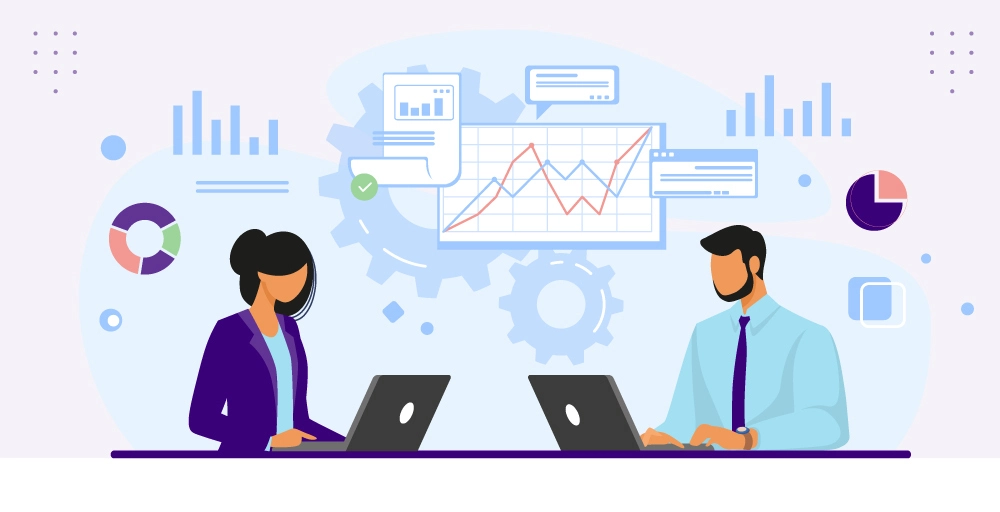
That said, businesses generally use conversational analytics to improve customer experiences and operational efficiency as it helps them understand customer needs better, and through that, they can optimize interactions and make data-driven decisions.
And how it’s done? Well, it’s done by using a combination of Artificial Intelligence (AI), Machine Learning (ML), and Natural Language Processing (NLP) to gather conversational intelligence (or customer conversational data). Moreover, the overall goal of the study is to better understand the customer experience.
Among the key elements of conversation analytics is call center voice analytics. It offers a detailed analysis of customer conversations to drive operational improvements, agent training, and strategic decision-making.
A typical conversation analysis example is listening directly to a customer’s voice to identify recurring narratives about their experience. Then, the conversations are analyzed for customer sentiment, and patterns are found that can help us understand customer behavior. By using those insights, businesses can then make improvements in their sales pitch or in their marketing efforts.
How does Conversation Analytics Work?
Conversation Analytics heavily depends on Natural Language Processing and Machine Learning to analyze and extract meaningful pieces of information from conversations carried out between humans, such as agents and customers, and then provide an understandable output.
Its working involves several steps, and to help you understand all the elements that are involved, here are those:
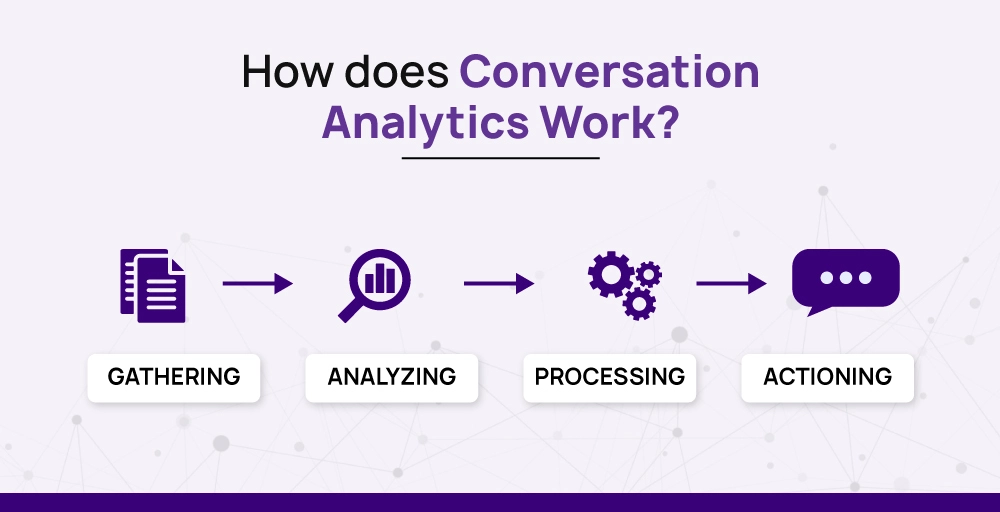
- Gathering Conversation Data.
- Using NLPs to covert verbal/written data so that computers analyze those through algorithms.
- Extracting details via data processing and feature extraction, such as studying the words used, tone of voice, and sentiment analysis.
- Taking actions based on the insights acquired.
What are the advantages of Conversation Analytics for your business?
Based on what we discussed earlier, conversation analytics is used to analyze and understand customer interactions and under what sentiment they are carrying out the conversation. That being said, businesses get all kinds of advantages by using it.
And to give you an essence of what’s what, here are some of the benefits:
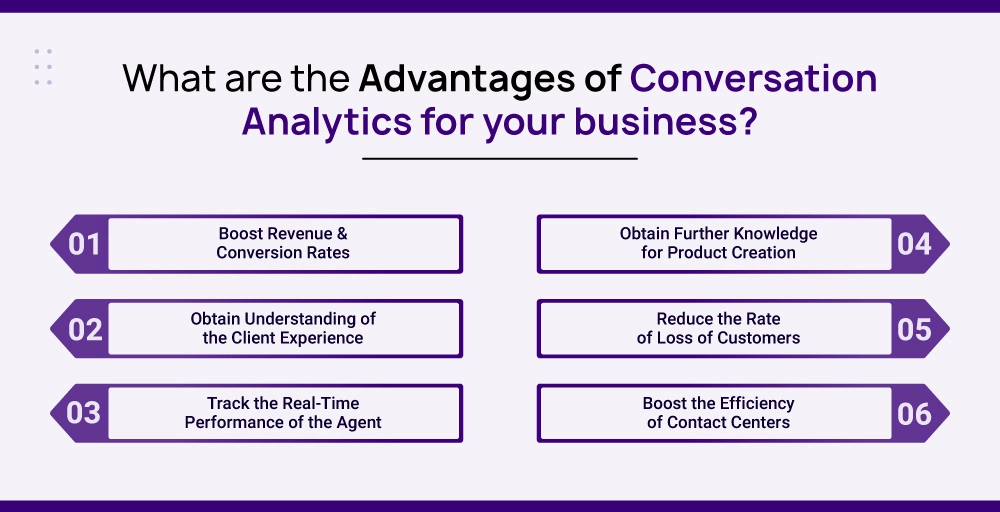
1. Boost revenue and conversion rates
Sales teams who work the phone must have insight into customer conversations, and speech analytics can help. You can also use it to inform your marketing strategy.
The traditional method of getting these insights was to record all your calls and listen to each one individually, beginning to end.
But nowadays, as AI and advanced algorithms are in use, they transcribe phone calls in real-time and provide actionable insights from customer interactions.
Analysis of customer data understanding preferences, and purchasing patterns allows businesses to make informed decisions, identify trends, optimize pricing strategies, and refine marketing campaigns, increasing conversion rates and revenue.
2. Obtain additional understanding of the client experience
Using conversational analytics, organizations can gain an in-depth understanding of their clients’ or customers’ experiences by analyzing data from their interactions.
Businesses can use AI to gain meaningful insights quickly and tailor their sales strategies based on customer preferences and purchase patterns.
As a result, customers receive a more delightful experience and are more satisfied, with upsells and cross-sells identified automatically.
3. Track the real-time performance of the agent
Through conversational analytics, agents are able to track their performance in near real-time by assessing customer and agent sentiment, providing visibility for monitoring their well-being, and enabling timely intervention for agent support.
Moreover, conversational analytics platforms can provide real-time monitoring of agent performance, helping to identify issues and provide support.
4. Obtain further knowledge for product creation
Conversational analytics, driven by AI, extracts insights from diverse customer interactions, guiding product customization for heightened satisfaction and loyalty. By analyzing data from phone calls, chats, and emails, businesses can better understand their customers.
This knowledge informs tailored strategies, improving overall customer satisfaction. Additionally, conversational analytics help identify upselling opportunities, shape personalized experiences, and inform product decisions based on customer feedback.
5. Reduce the rate of loss of customers.
Customer pain points can also be identified through conversation analytics. Using conversational analytical tools, businesses can identify common characteristics of previously churned customers and segment current customers accordingly to forecast churn.
Say, for instance, you’re a software company that discovered that customers were not fully utilizing all of your software’s features, so they churned. If you are noticing low customer engagement, you could modify your UX and provide resources like product guides and demos to improve usability.
6. Boost the efficiency of contact centers
Conversation analytics also allows businesses to flag specific keywords and problems easily.
Another way to use this data creatively is to categorize and route based on it. By reviewing the recordings of your agents’ calls, you can identify which agents are better at handling specific topics, which can help you create more effective call-routing strategies.
Analytics and insights can help you place agents in the call queue that are most relevant to their knowledge and skills.
What are the Use Cases of Conversation Analytics?
As said earlier, the advantages of using conversation analytics are immense, and hence, keeping up with the trend, here are some use cases of conversation analytics in a business environment:
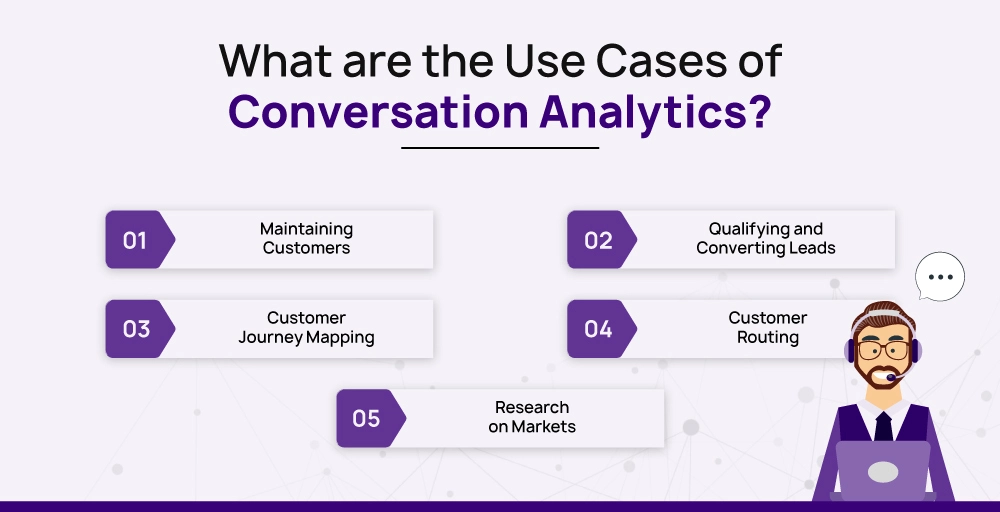
1. Maintaining customers
Conversation analytics is a powerful tool with diverse use cases across various industries. One key application is in maintaining customer relationships. By analyzing customer interactions, organizations can learn more about customers’ preferences, sentiments, and pain points, allowing them to tailor their approach and provide personalized experiences.
This enhances customer satisfaction, fosters loyalty, and helps in the proactive resolution of issues, ultimately contributing to long-term customer retention.
2. Qualifying and converting leads
Another significant use case is in qualifying and converting leads. Conversation analytics enables businesses to assess the effectiveness of their communication strategies during lead interactions. By identifying patterns and understanding customer behavior, organizations can optimize their sales processes, prioritize high-quality leads, and tailor their messaging for more successful conversions.
This data-driven approach enhances the efficiency of sales teams and contributes to a more targeted and effective lead qualification process, ultimately driving revenue growth.
3. Customer journey mapping
By analyzing the entire customer interaction lifecycle, businesses can get a comprehensive understanding of customers’ preferences, touchpoints, and pain points. And thus create an accurate customer journey map to optimize their processes to improve customer experience.
Moreover, conversation analytics facilitates customer routing, ensuring that inquiries are directed to the right departments or individuals based on the analysis of conversation content and context.
4. Customer routing
Conversation analytics plays a crucial role in optimizing customer support and service interactions. By analyzing conversations between customers and support representatives, businesses can gain a deeper understanding of customer requirements, issues, and satisfaction levels. This data can be leveraged to implement intelligent customer routing systems that direct inquiries to the most suitable support agent or department based on the nature of the query.
This not only enhances the efficiency of customer service but also contributes to a more personalized and streamlined experience for customers, leading to improved customer satisfaction and loyalty.
5. Research on markets
In the realm of market research, conversation analytics provides a powerful tool for extracting meaningful trends and patterns from large datasets of customer interactions. By analyzing conversations across various channels, such as social media, customer support chats, and online forums, businesses can uncover valuable insights into market sentiment, emerging trends, and consumer preferences.
The ability to identify and understand the nuances of customer sentiment through conversation analytics enables companies to respond swiftly and effectively to market dynamics, shaping products and marketing strategies.
What are the common challenges of conversation analytics?
Having learned all the ins and outs of conversation analytics, let’s now take a look at what challenges you can face when using as well as choosing one for your business:
1. Uncertainty and ambiguity of natural language
One common challenge of conversation analytics lies in the uncertainty and ambiguity inherent in natural language. Understanding the nuances, context, and varied expressions within human conversations can be complex, making it challenging for analytics systems to accurately interpret and analyze interactions.
2. Data security and privacy.
Data security and privacy concerns represent another significant hurdle. Analyzing conversational data requires access to sensitive information, raising issues regarding the protection and ethical use of personal data. Striking a balance between extracting valuable insights and safeguarding customer privacy is crucial to the successful implementation of conversation analytics.
3. Acceptance by users and trust.
Acceptance by users and building trust in the technology are also challenges. Users may be apprehensive about the idea of their conversations being analyzed, leading to concerns about invasion of privacy. Ensuring transparency, obtaining consent, and communicating the benefits of conversation analytics are essential to gain user acceptance and establish trust.
4. Multilingual assistance.
Multilingual assistance poses a challenge due to the diverse nature of languages and dialects. Conversation analytics systems need to be proficient in understanding and processing various languages to provide accurate insights, which can be a complex task.
5. Reliability of data.
Reliability of data is another challenge, as conversation analytics heavily depends on the quality and completeness of the data it analyzes. Incomplete or inaccurate data can lead to flawed insights and decision-making, emphasizing the importance of data accuracy and consistency.
6. Bias in training data.
Lastly, the presence of bias in training data is a significant challenge. If the data used to train conversation analytics systems is biased, it can result in unfair or inaccurate outcomes. Addressing bias requires careful curation of diverse and representative training datasets to ensure fair and unbiased analysis.
5 Best Conversation Analytics Software in 2024
Now that we’ve covered everything, from the definition to how it works and from its advantages to the challenges faced when using a conversation analytics tool. So, now let us go ahead and discuss where to get one.
To be fair, choosing one can be difficult, so to assist you with that, we’ve already done the research for you and put forth the top choices based on the following factors:
- User Interface & Visualization
- Data Integration and Analytical Capabilities
- Features and Functionalities
- Ease of Use and Cost Structure
- Reliability, Scalability, and Support
| Software | Pricing | Key Features | Best for |
| Chorus | Contact Sales | AI analytics, Sales coaching, Deal intelligence, and ASR | Mid-market and enterprise-level organizations |
| CallRail | Starts at $40 /month | Conversation intelligence, Call Score, Acquisition reports, Behaviour Reports | All business sizes |
| Hubspot Sales Hub | Starts at $18 /month | Forecasting, Conversation Intelligence, Sales Analytics, and Reporting | All business sizes |
| Salesforce Sales Cloud | Starts at $25 /user/month | Einstein Conversation Insights, Sales AI, Revenue Intelligence, Activity Management | Businesses of all sizes and types |
| Avoma | Starts at $24 /user/month | Conversation Intelligence, Revenue Intelligence, Advanced AI Summarized notes | All Business sizes |
1. Chorus
Backed by many patented machine-learning innovations, Chorus is a conversation intelligence platform provided directly by ZoomInfo. It offers various features and functionalities that help sales and marketing teams capture and analyze the interactions they have had with their clients and customers.
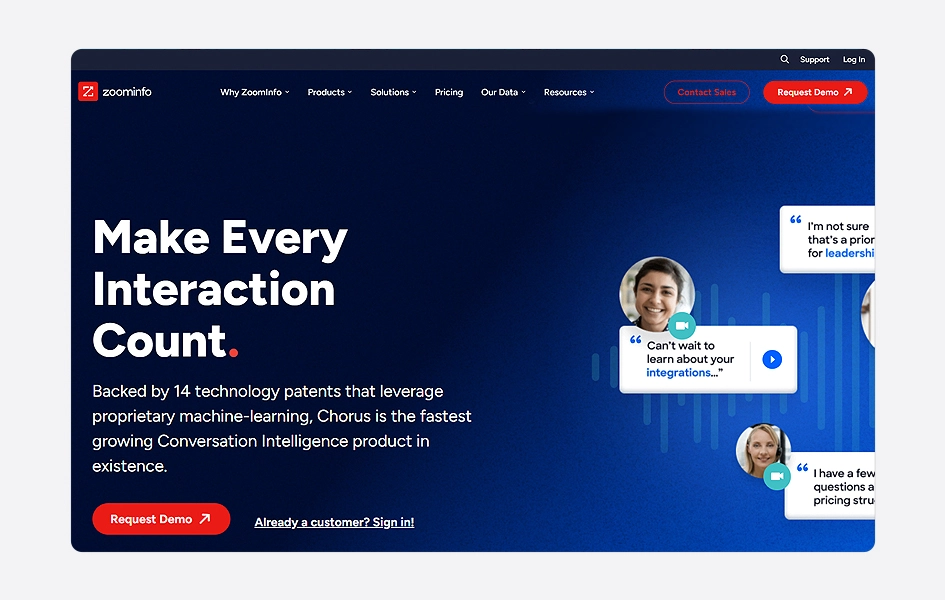
The platform conversational analytics softwares comes with immense capabilities that can help transcribe and analyze all customer data, including calls, meetings, and emails. It’s a valuable tool for salespeople, as it helps them learn from and make improvements in their interactions, which can result in more effective and informed sales campaigns.
💰 Pricing
- Contact Sales
2. CallRail
CallRail is considered one of the best conversational analytics software due to its AI-powered Conversation Intelligence feature that transcribes and analyzes phone calls to provide insights into customer behavior, sentiment, and conversation topics.
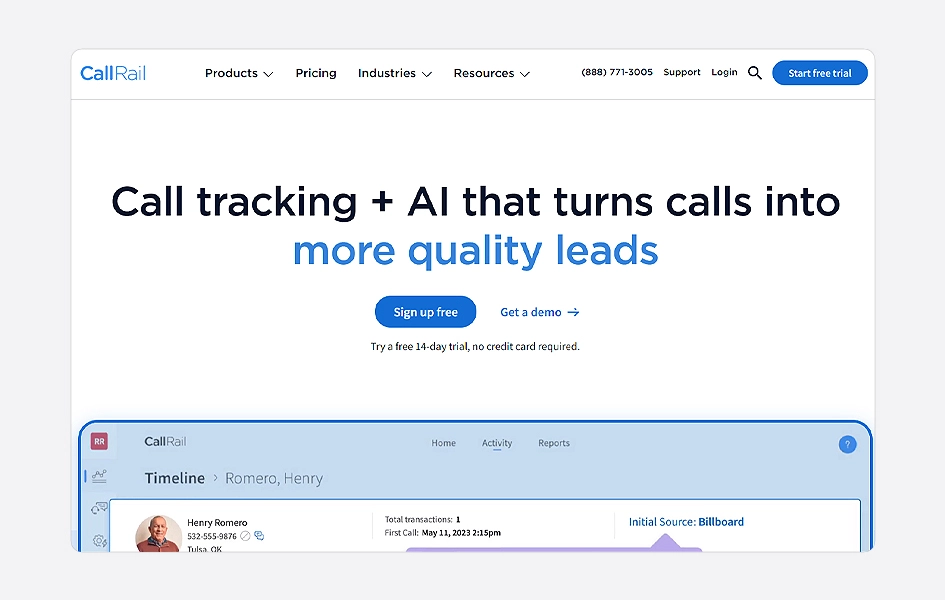
It offers robust analytics and reporting features, including call duration, caller demographics, and call recordings, to help businesses better understand their customer interactions and optimize their marketing spend.
Additionally, CallRail’s keyword-level call attribution feature allows businesses to track which specific keywords are driving phone calls, helping marketers understand the effectiveness of their SEO and advertising campaigns.
💰 Pricing
- Call Tracking: $40 /month
- Call Tracking + Conversation Intelligence®: $85 /month
- Call Tracking + Form Tracking: $85 /month
- Call Tracking Complete: $130 /month
3. Hubspot Sales Hu
HubSpot’s Sales Hub is a comprehensive sales software solution that caters to businesses of all sizes, from startups to enterprises. It offers a range of features to streamline sales processes, empower data-driven decisions, and enhance customer relationships.
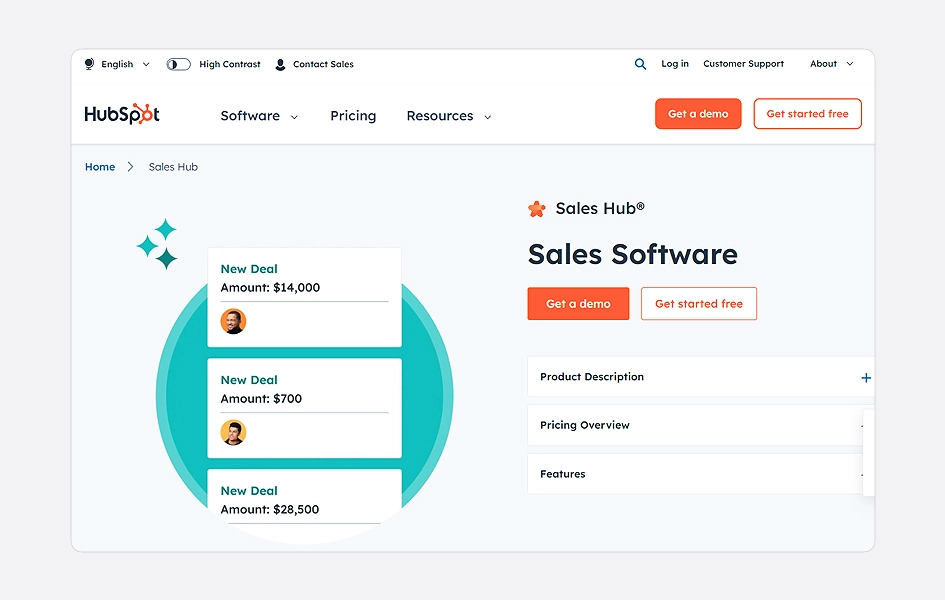
The Sales Hub includes tools for call tracking, prospecting, sales automation, quote generation, lead management, email templates, email tracking, and more. It is designed to work seamlessly with HubSpot’s Smart CRM, providing deeper insights into prospects, automating tasks, and helping to close more deals.
💰 Pricing
- Free: $0 /month(additional charged)
- Starter: $18 /month
- Professional: $450 /month
- Enterprise: $1,500 /month
4. Salesforce Sales Cloud
Salesforce Sales Cloud is a customer relationship management (CRM) platform that provides a range of sales automation tools and conversational analytics tools to help businesses manage their sales processes more efficiently. It includes features such as lead and pipeline management, AI insights, coaching tools, connectivity with other channels, visual sales cadences, customizable reports and dashboards, forecasting, opportunity management, and more.
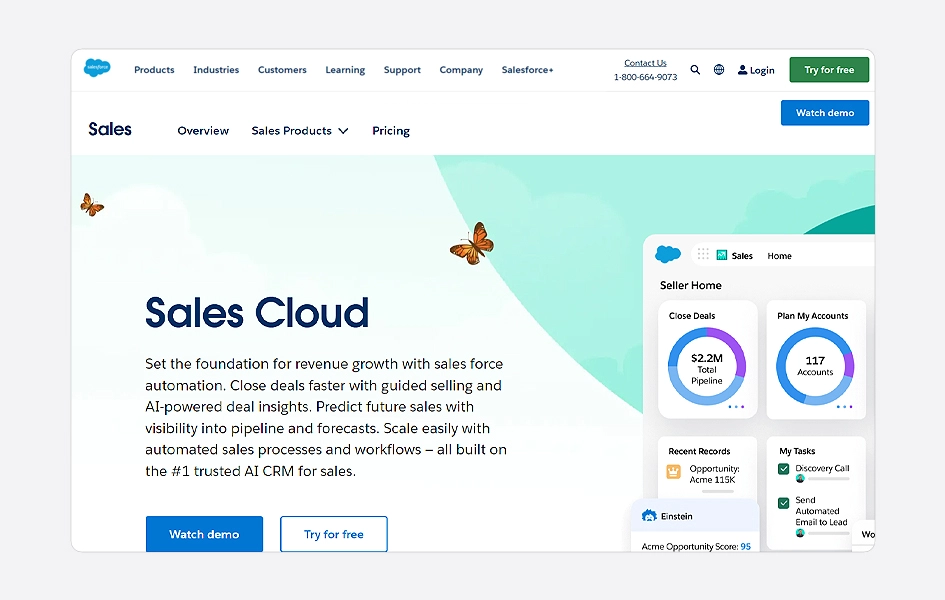
Salesforce Sales Cloud is built on the #1 trusted CRM platform and offers AI and automation built-in, enabling organizations to deliver revenue management from start to finish. Salesforce Sales Cloud is available in different editions.
💰 Pricing
- Starter Suite: $ 25 /user/month
- Professional: $ 80 /user/month
- Enterprise: $ 165 /user/month
- Unlimited: $ 330 /user/month
- Unlimited+: $ 500 /user/month
5. Avoma
Avoma is considered a leading conversational analytics software due to its advanced AI meeting assistant that transcribes and summarizes meetings accurately, streamlines the meeting process, and provides actionable conversation intelligence.
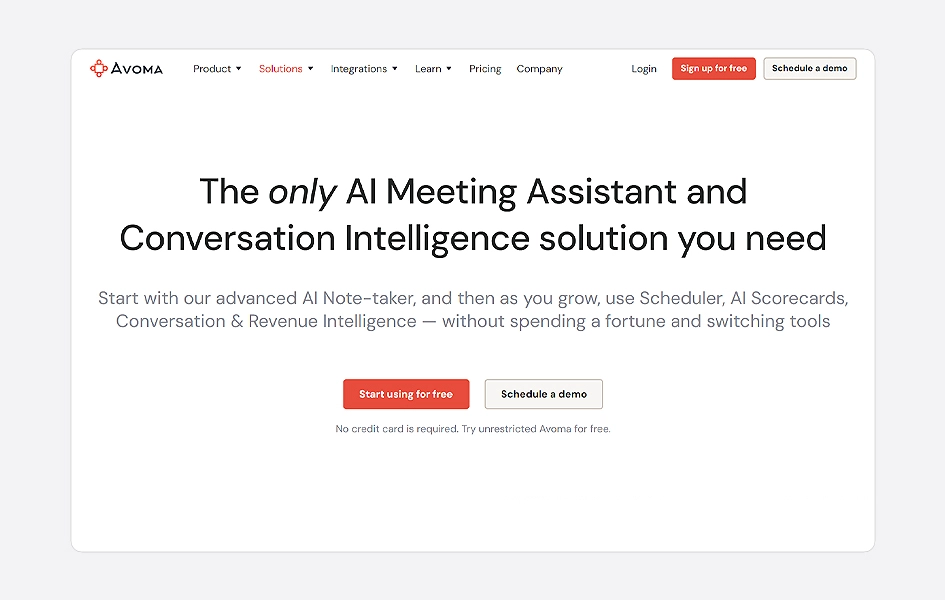
Unlike other platforms, Avoma is positioned as a conversational analytics solution provider that can be used by both managers and sales representatives, allowing for ongoing learning and productivity gains.
It seamlessly integrates with various software such as CRM, video conferencing, dialers, and calendar applications, enhancing its usability and effectiveness. Additionally, Avoma offers flexible pricing options, including a free forever plan with limited offerings, making it accessible to businesses of various sizes.
💰 Pricing
- Basic: $ 0/user/month (hidden charges)
- Starter: $ 24 /user/month
- Plus: $ 59 /user/month
- Business: $ 79 /user/month
- Enterprise: $ 129 /user/month
Enhance customer service with KrispCall’s Call Analytics features
KrispCall’s Call Analytics feature provides a 360-degree view of real-time call data, including total call volume, call duration, inbound calls, outbound calls, and missed calls. To access this feature, users can sign up for a KrispCall account, choose a phone number, and then view the call data on the dashboard.
The call analytics feature assists businesses in gaining insights into their call center operations, monitoring customer engagement levels, and analyzing agent performance. Additionally, KrispCall offers a call recording feature that enables the capture of detailed call recordings, automatic call recording, and the ability to listen to recorded calls at different speeds, which can be used to track agent performance, analyze data and insights, and monitor customer satisfaction rates.
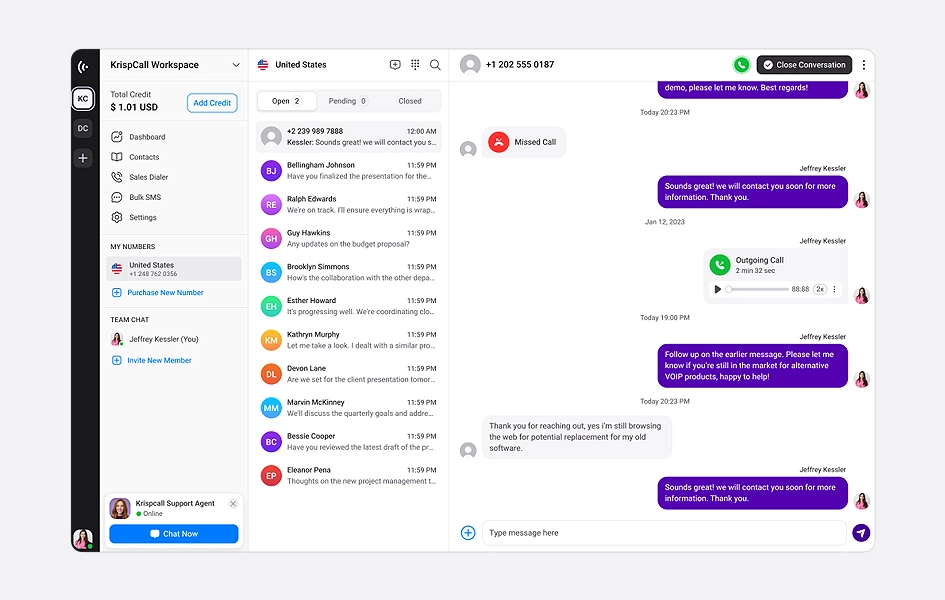
Additionally, KrispCall’s cloud telephony platform also supports a wide range of advanced calling features, such as live call monitoring and call reports, making it a comprehensive solution for businesses of all sizes.
Closing Thoughts!
Conversation analytics is a powerful tool that can change the way businesses typically understand and engage with their audience and customers. That said, the benefits, use cases, and challenges associated with this technology highlight its transformative potential.
Likewise, as industry standards evolve and technology advances, Conversation Analytics is poised to play a pivotal role in shaping the future of customer interactions!
And if your goal is to get ahead of your competition by gaining access to all the call analytics, then KrispCall is the best answer. So, without holding yourself back, get started with KrispCall and its services!
FAQs
Why is it necessary for businesses to analyze customer conversations?
Businesses need to analyze customer conversations for a variety of reasons, many of which boil down to gaining valuable insights to improve their operations and interactions with customers.
That said, here are some other reasons why it is necessary for businesses to analyze customer conversations:
- To understand specific customer needs and preferences.
- To improve customer service delivery by understanding customer pain points.
- Boosting sales and improving marketing strategies.
- Reducing churn rate and saving time & resources.
What types of businesses can take advantage of using conversation analytics?
Using conversational analytics can be extremely useful for businesses of various types and sizes and can help them improve their customer service delivery, gain insight into their customer sentiment, and improve their overall operational efficiency. Some specific examples will provide a clear insight into what types of businesses can benefit from conversational analytics:
- Call and Contact Centers
- Sales and Customer Support
- Marketing and Financial Services
- Healthcare and Hospitality
- E-commerce and Online Retail
How much does it cost to employ and utilize conversation analytics?
Employing and utilizing conversation analytics software can cost you as little as $50 per user per month for basic services or as high as $500 per user per month for more advanced accessibility to features and functionalities.
However, you should remember that the actual cost of the specific service you choose might depend on the service provider you choose, the services it has to offer, the additional/mandatory feature you ought to seek, the subscription plans offered by the provider, and your specific geographical location.
What are the various types of conversation analytics?
Based on the methodologies used, conversation analytics can be categorized into the following types:
- Text Analytics: It is used to focus on the analysis of texts in emails, chats, social posts, and other texts.
- Speech Analytics: It is used to transcribe voice patterns into data that is then used to analyze through various means.
- Conversation Intelligence: Used to analyze both text and speech data through sophisticated AI tools, NLP systems, and sometimes machine learning.
- Multimodal Analysis: Similar to Conversation Intelligence, however, is used to analyze and understand the tone of voice, volume, and non-verbal cues such as body language and facial expressions.

